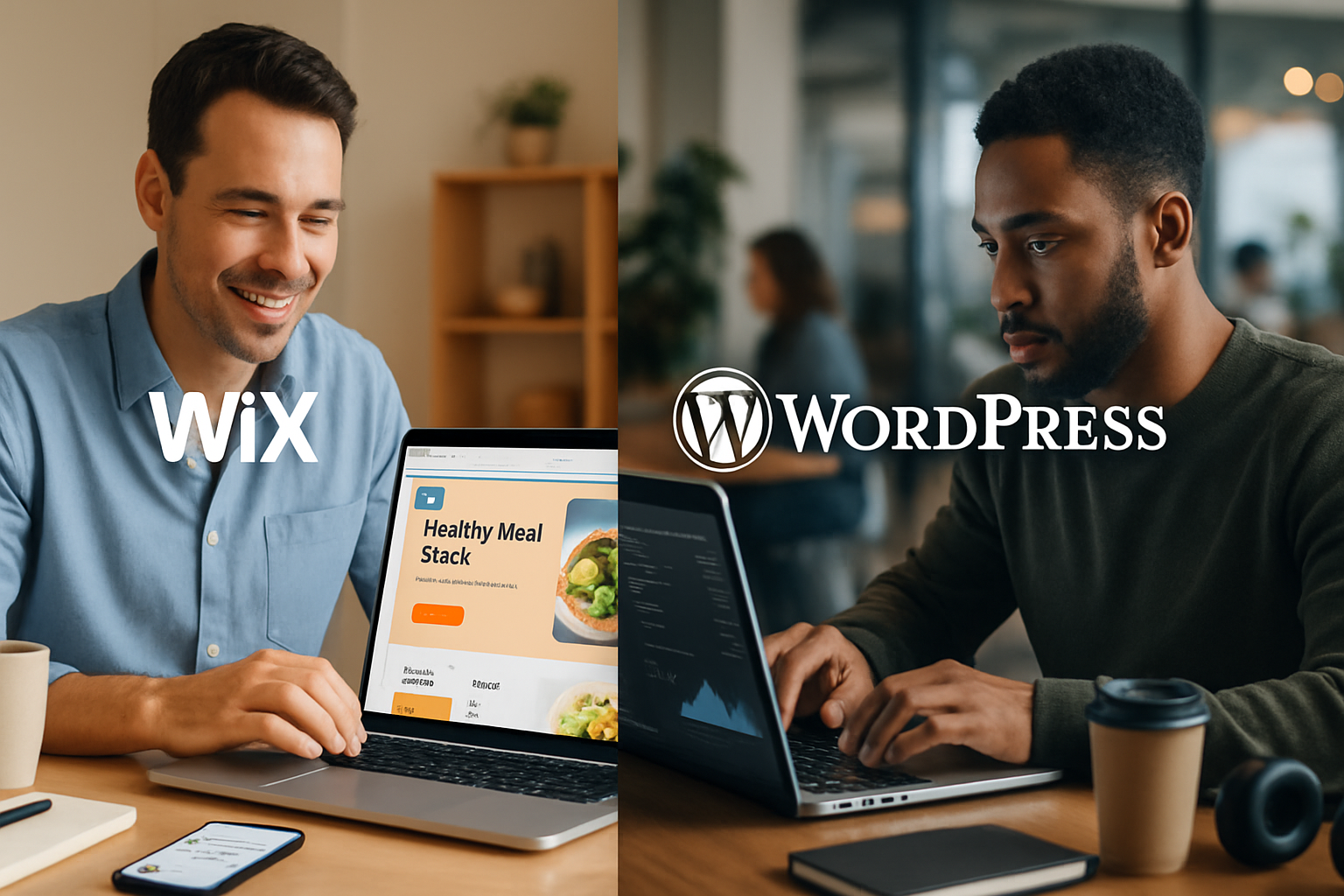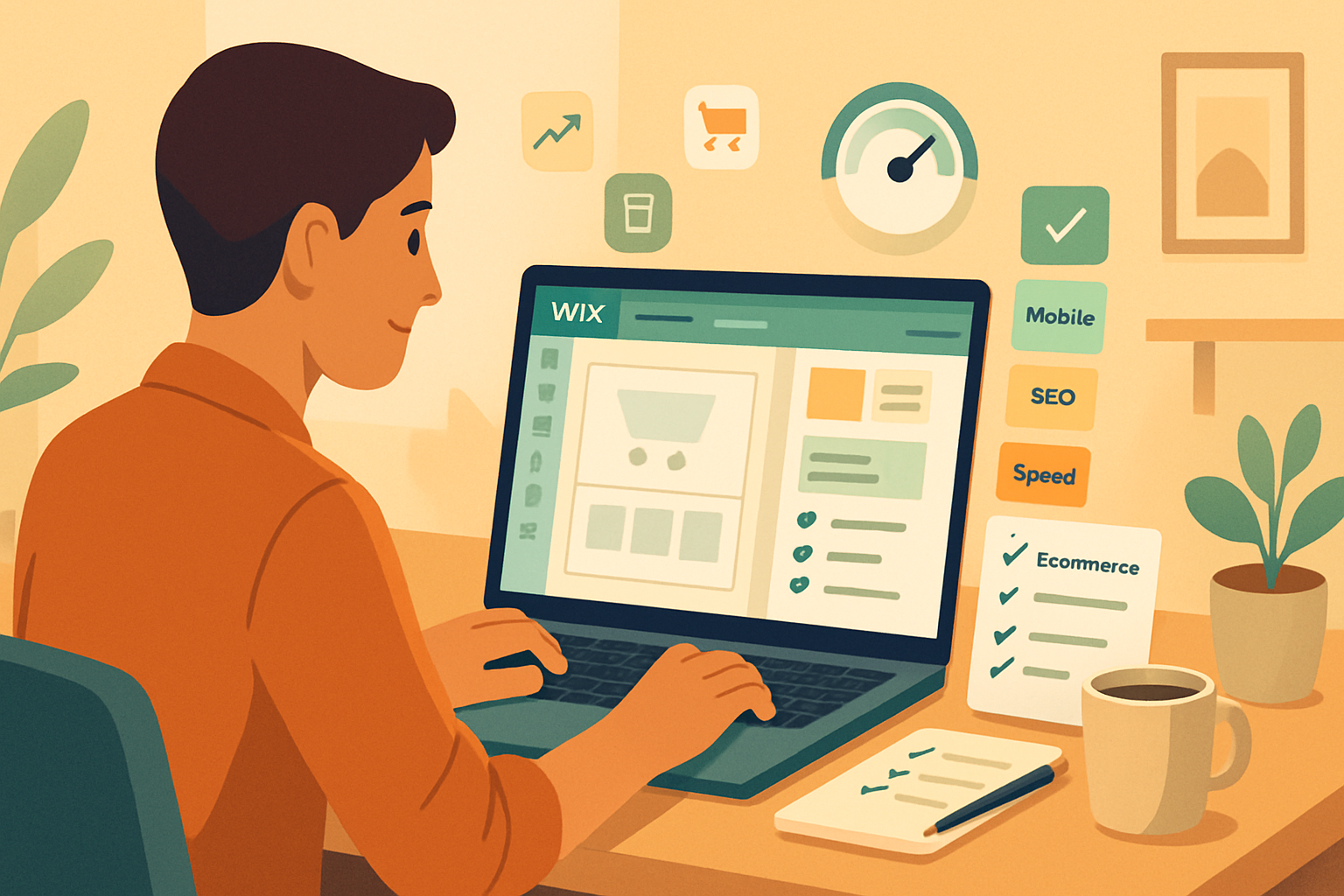· business · 7 min read
Wix vs. WordPress: The Ultimate Showdown for Small Businesses
A practical, no-nonsense comparison of Wix and WordPress for small businesses - covering ease of use, pricing, customization, SEO, e-commerce, maintenance, real user pain points, and clear recommendations for different business needs.

What you’ll get from this article
You’ll walk away with a clear decision path: when Wix is the faster, simpler win - and when WordPress is the better long-term investment for growth. Read this if you want to choose the platform that fits your budget, technical appetite, and growth goals.
Short answer up front. Wix gets you to a polished site quickly. WordPress gives you unlimited control and scale - if you’re willing to manage it.
Quick TL;DR
- Choose Wix if you want the fastest path to a good-looking site with minimal fuss and maintenance.
- Choose WordPress (self-hosted WordPress.org) if you want full ownership, advanced features, and the ability to scale without platform limits.
- Consider WordPress.com (hosted) only if you want less maintenance than self-hosted WP but more flexibility than Wix.
Two different products, one comparison
Important distinction: “WordPress” can mean WordPress.org (self-hosted) or WordPress.com (hosted plans). They share the same core but differ in who manages hosting, updates, and restrictions. Wix is an all-in-one hosted site builder with drag-and-drop editing.
- Wix - closed platform, hosting included, visual builder, app marketplace. See Wix pricing and plans:
- WordPress.com - hosted WordPress with plan tiers and restrictions:
- WordPress.org - the free, open-source software you install on your own hosting. Guides:
Ease of use - who wins for busy owners?
Wix: designed for beginners. Visual drag-and-drop. Templates and guided setup. You can launch in hours. No separate hosting, no FTP, no plugin conflicts to troubleshoot.
WordPress: steeper learning curve. You’ll choose themes, plugins, and hosting. The initial setup takes longer and you’ll need to learn basics - hosting panels, backups, updates. But templates (themes) and page builders (Gutenberg, Elementor) make design approachable once you learn them.
Verdict: Wix wins for instant ease. WordPress wins if you can invest time (or a small developer budget) to learn it.
Design & customization
Wix
- Pros - Pixel-perfect visual control, lots of modern templates, built-in media handling.
- Cons - Less deep customization; advanced layout work can be limited or require workarounds.
WordPress
- Pros - These days, near-limitless design options. Access to thousands of themes, page builders (Elementor, Beaver Builder), and full-site-editing (FSE) with Gutenberg. You can alter PHP/CSS if needed.
- Cons - Inconsistencies between themes/plugins; deeper customization often requires code or a developer.
If you want a very specific design or custom feature, WordPress almost always offers the path. If you want a great-looking site fast, Wix often gets you 80–90% of the way without coding.
Plugins, apps and feature extensibility
- Wix App Market covers common needs (forms, bookings, live chat, email marketing). Good for straightforward features.
- WordPress has an enormous plugin ecosystem (50k+ plugins). Need a membership system, advanced LMS, custom directory, or complex shipping rules? There’s likely a plugin or developer solution.
Caveat: WordPress plugins vary in quality. Expect occasional conflicts and the need to maintain them.
SEO and marketing
Wix has come a long way on SEO tooling - customizable meta tags, clean URLs, structured data, and built-in SEO Wiz for guidance. It’s fine for most small businesses.
WordPress gives you advanced SEO control through plugins like Yoast SEO and Rank Math, plus server-level optimizations. If content marketing and technical SEO matter to your growth plan, WordPress provides more levers.
References: Yoast and Rank Math resources: https://yoast.com/ and https://rankmath.com/
E-commerce: small store vs growing catalog
Wix
- Good for small catalogs and simple stores.
- Built-in payments, inventory, shipping options via plans labeled Business and eCommerce.
- Convenient if you want to manage everything inside Wix.
WordPress + WooCommerce
- WooCommerce turns WordPress into a full-featured store. Highly extensible - subscriptions, multi-vendor, complex shipping, POS integrations.
- More moving parts - hosting must handle traffic and checkout load; you’ll manage plugin updates and security.
If you expect to scale to hundreds or thousands of SKUs, complex shipping rules, or unique checkout flows - WordPress/WooCommerce is the safer long-term pick.
Pricing - what small businesses actually pay (as of 2024)
Numbers change - always check current pages. These are typical ranges you’ll encounter.
Wix (hosted)
- Free tier - available with Wix ads and a Wix subdomain.
- Business/eCommerce plans - roughly $23–$49+/month for most small stores (billed annually). See current Wix pricing:
WordPress.org (self-hosted)
- Hosting - $3–$15+/month for shared hosting (Bluehost, SiteGround) for very small sites. Managed WordPress hosting: $20–$100+/month (Kinsta, WP Engine) for higher performance and support.
- Domain - ~$10–20/year.
- Premium theme or page builder - $30–$100 one-time or yearly.
- Plugins/extensions - many are free, but premium plugins can add $50–300/year.
WordPress.com (hosted)
- Plans range from Personal ($4–8/month) to Business and eCommerce ($25–45+/month) depending on features and customization needs.
Realistic small-business budget examples:
- Minimal brochure site on Wix - $15–23/month.
- Brochure site on WordPress with shared hosting - $5–15/month + occasional premium theme/plugin costs.
- Small store on Wix Business plan - $23–49/month.
- Small store on WooCommerce with managed hosting - $30–100+/month once you include hosting and extensions.
Scalability and performance
Wix: Wix handles scaling for you. For many small businesses, this is a benefit - you don’t deal with server caches or CDN setup. But you’re limited by what Wix allows; very specialized scaling or integrations can be impossible.
WordPress: Scalability depends on your hosting and architecture. With the right managed host, CDN, caching, and optimization, WordPress scales from small blogs to high-traffic commercial sites. That power comes with responsibility: you or your host manage optimization, backups, and upgrades.
If you predict high traffic, heavy custom functionality, or complex integrations, WordPress on a solid host is more flexible.
Security, maintenance, and backups
Wix handles all security, patches, and backups. That’s a huge plus for non-technical owners.
WordPress requires you (or your host) to manage updates to core, themes, and plugins. Vulnerable plugins are the typical attack vector. Managed hosts often include automatic backups and security hardening, which reduces the burden.
Trade-off: WordPress gives control and responsibility. Wix gives convenience with less control.
Real user experiences - common praise and complaints
Collected from reviews and community threads (summarized):
- “Wix let me launch a professional site in a weekend. No developer needed.” - common praise for speed and simplicity.
- “I hit a design limit and couldn’t implement a custom checkout flow in Wix.” - a repeated pain point for growing stores.
- “WordPress gives me everything my agency needs, but the plugin maintenance is real work.” - typical agency view.
- “I migrated from Wix to WordPress to regain control and avoid platform lock-in, but migration cost time and money.” - migration bittersweetness.
These reflect the same trade-offs: convenience vs control.
Migration and portability
Wix is a closed platform. Exporting content to move off Wix is possible but can be limited and sometimes manual (especially for design and complex apps). That can create vendor lock-in.
WordPress.org is portable - your files and database are yours. Migrations can be technical but straightforward if you know what you’re doing or hire help.
If portability and ownership are priorities, WordPress wins.
Decision checklist for small businesses
Ask yourself these questions:
- How fast do I need to launch? (Wix advantage)
- How much customization will I need in 12–36 months? (WordPress advantage)
- Will I run a growing e-commerce operation with complex requirements? (WordPress/WooCommerce)
- How much time or budget can I dedicate to maintenance? (Wix if very limited)
- Do I need total ownership and portability? (WordPress)
If you answered: launch fast, minimal long-term customization, limited budget for maintenance → Wix.
If you answered: scaling, advanced SEO/content strategy, complex e-commerce or integrations, desire for ownership → WordPress.
Recommendations by common small-business scenarios
- Local service business / single-location restaurant / small portfolio - Wix or WordPress (shared hosting). Choose Wix for speed, WordPress if you plan serious content marketing.
- Boutique e-commerce with <200 SKUs and standard flows - Wix can work. Consider WooCommerce if you expect rapid growth or complex shipping/pricing.
- Content-first business (blogs, memberships, courses) - WordPress (self-hosted) almost always provides more tools and control.
- Agency or tech-savvy team building multiple client sites - WordPress for reusability, multisite, and plugin ecosystem.
Final verdict - no universal winner
For many small businesses the real question isn’t “Which is better?” but “Which fits my priorities today and in two years?” Wix buys time and simplicity. WordPress buys control and scale.
Pick Wix when speed, low maintenance, and simplicity are the top priorities. Pick WordPress when ownership, extensibility, and future-proof scaling are non-negotiable.
Make the decision with your future needs in mind. A quick launch is tempting. But control and portability matter when growth begins. Choose the platform that gives you control - not the one that controls your options.



